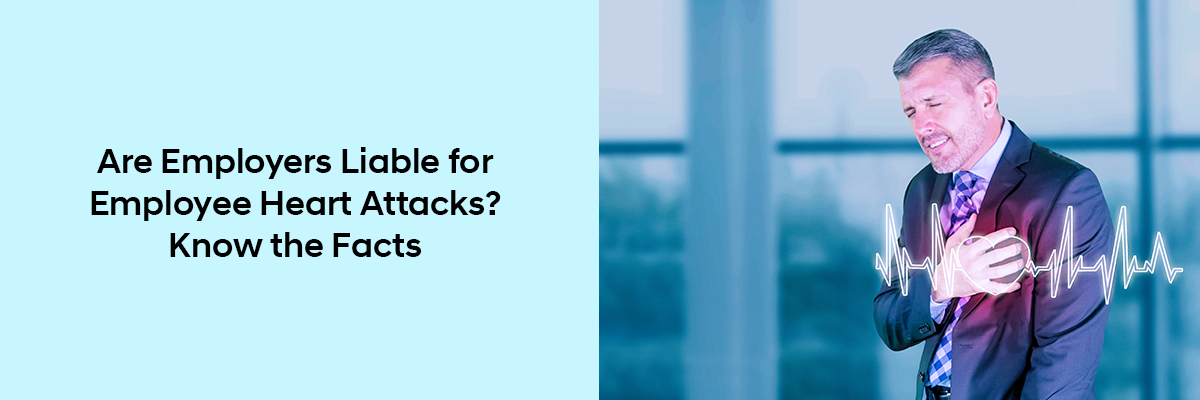Heart attacks are no longer rare or shocking; they’ve become increasingly common in today’s fast-paced world. Poor lifestyle choices, unhealthy diets, lack of sleep, excessive reliance on medication, smoking, alcohol use, drug abuse, pre-existing medical conditions, chronic stress, and even overexercising can all put severe strain on the heart.
But here’s the tricky question: when an employee suffers a heart attack, can the employer be held responsible? Is it fair to say the workplace caused it, or is it always a matter of personal health? Let’s break it down.



The Role of the Workplace in Employee Health
The workplace plays a significant role in an individual’s well-being. A healthy working environment isn’t just about ergonomic chairs or free coffee; it’s about reducing unnecessary stress, promoting balance, and ensuring employees feel supported.
Good employers understand that employees work best when they are not overwhelmed, overburdened, or pushed beyond reasonable limits. Stress at work is inevitable to some extent, but excessive or unmanaged stress can contribute to serious health problems, including cardiovascular issues.
That’s why responsible management involves:
- Monitoring workloads to prevent burnout.
- Offering flexible working arrangements or time off when needed.
- Creating open channels for employees to voice concerns.
- Taking proactive steps to address workplace stressors.
To know more about FMLA and employee burnout do give our in-depth blog a read.
When Can Employers Be Liable?
Employers are not automatically responsible for an employee’s heart attack. After all, many heart-related conditions stem from personal health choices and pre-existing factors. However, there are circumstances where liability could arise.
An employer may be considered liable if:
- They knowingly created or ignored a high-stress environment that directly impacted the employee’s health.
- They refused reasonable accommodations, such as medical leave or flexible work hours, even after being aware of the employee’s health condition.
- The employer forced excessive overtime or unrealistic performance demands that led to chronic stress.
- Workplace policies or practices discouraged employees from taking breaks, rest, or medical help when necessary.
Additionally, if a heart attack occurs at the workplace itself, scrutiny on the employer’s role often intensifies. Even if the underlying cause is a personal health issue, the fact that the medical event happened on company premises can increase the perception of employer responsibility, especially if emergency response measures or preventive wellness policies were lacking.
In such cases, the connection between workplace practices and the employee’s health outcome becomes stronger, raising questions of liability.
What Employers Can Do to Reduce Risks
Employers can’t control every aspect of an employee’s health, but they can create a work environment that reduces unnecessary risks. Steps include:
- Encouraging regular breaks and reasonable working hours.
- Promoting wellness programs that support exercise, nutrition, and stress management.
- Allowing paid sick leave and mental health days without stigma.
- Providing access to counseling or employee assistance programs.
- Training managers to recognize signs of burnout or distress.
By taking these measures, employers not only protect themselves from liability but also foster a healthier, more productive workforce.
To know more about can an employer deduct wages for mistakes, do give our in-depth blog a read.
How Employers Can Protect Themselves from Legal Claims
Even with the best efforts, employers may worry about being sued if an employee suffers a heart attack. While lawsuits are not always successful, companies can take practical steps to reduce their legal risks:
- Maintain Clear Policies: Document workplace policies on stress management, breaks, overtime, and health accommodations. Written policies show that the company takes employee well-being seriously.
- Provide Reasonable Accommodations: When employees disclose medical conditions, respond appropriately with flexible schedules, reduced workloads, or medical leave when needed. Ignoring such requests can create legal vulnerability.
- Keep Records: Maintain clear documentation of workloads, hours, leave approvals, and support provided to employees. Good records can serve as evidence if a claim arises.
- Offer Training: Train managers to handle stress-related complaints properly and to respond promptly when health issues surface.
- Obtain Insurance: Employers can consider liability or employment practices insurance to cover potential legal costs in the event of claims.
- Seek Legal Guidance: Consult with legal or HR professionals to ensure workplace practices comply with labor and health laws.
These steps won’t eliminate every risk, but they help employers demonstrate that they acted responsibly, making it harder for a lawsuit to succeed.
The Bottom Line
While heart attacks are influenced by many personal factors, the workplace can certainly play a role in either worsening or alleviating risks. Employers are not automatically liable for every health issue an employee faces, but if workplace stress, pressure, or negligence significantly contributes to the problem, liability becomes a real possibility.
For employees, it’s important to recognize early warning signs and seek medical help rather than pushing through dangerous levels of stress. For employers, the best approach is proactive: create a supportive environment where employee health is taken seriously, not as an afterthought.
We hope you found this blog informative and helpful. If you’re looking to expand your knowledge on fair housing laws and best practices, be sure to check out our Fair Housing Training Webinars, where you can access a wealth of expert-led sessions, both upcoming and previously recorded, to stay informed and compliant.


